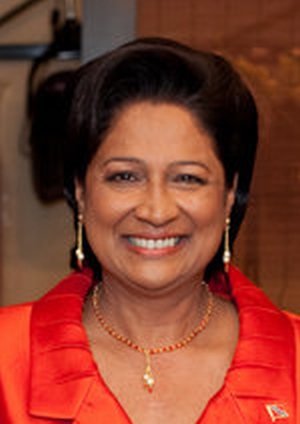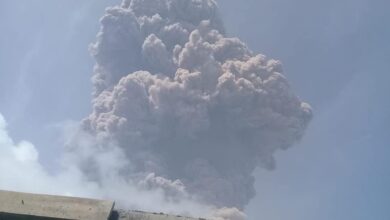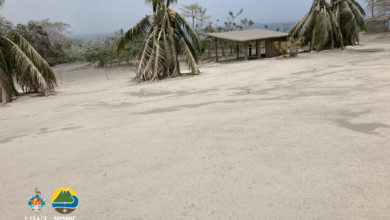I take great pleasure today in formally passing Chairmanship of the Conference of the Heads of Government of the Caribbean Community (CARICOM) to Dr The Honourable Ralph Gonzalves, Prime Minister of St Vincent and the Grenadines.
I congratulate him and express my sincerest hope that his tenure will be rewarding and productive, and pledge every possible support that he will need.
My tenure as Chairman came as a source of great honour and pride for Trinidad & Tobago, as it coincided with the celebration of the 40th anniversary of CARICOM.
It was in 1973, through the Treaty of Chaguaramas, that CARICOM was established with signatures from Barbados, Guyana, Jamaica and Trinidad & Tobago.
Since that time, it has been four decades since our nations and our peoples came together, as a community, to forge a common future built on shared hopes and dreams.
Today, I am sure you will agree there are many successes we can discuss, even as we continue to face many challenges which, together, we can and must overcome.
T&T’S TENURE
Decisions taken at the 34th Regular Meeting of the Conference, as well as urgent matters which arose, helped in great measure to shape my tenure as Chairman.
Economic challenges which faced Member States and the Region were brought to the top of our agenda and I am delighted that one of the major outcomes was the approval for the establishment of the Commission on the Economy to advise us on solutions that would lead to growth and development.
The Commission’s work has already begun and with a deep appreciation of the fact that sustainable development can only be achieved through the free movement of people and goods, reliable transportation across the region has also become a top priority.
Also in July, the Conference of Heads of Government agreed to establish a CARICOM Reparations Commission to shape the Community’s quest for reparations from the former colonial European countries, for native genocide, the trans-Atlantic slave trade and a racialized system of chattel slavery.
The Executive of the CARICOM Reparations Commission met on December 9, 2013 in Jamaica to define and set in train its plan of action.
A regional dialogue on persons living with disabilities and special needs was also commenced in July, and by year’s end, a High Level Meeting on the Rights of persons with disabilities in the Caribbean was convened in Haiti.
It is my hope that this initiative will progress quickly so that we can achieve a fully disability-friendly region.
You will recall that in November, the Bureau met in special session to discuss the ruling of the Constitutional Court of the Dominican Republic on nationality.
This ruling retroactively stripped tens of thousands of Dominicans, mostly of Haitian descent, of citizenship, rendering them stateless and with no recourse to appeal.
This matter was treated with the highest priority and further to the suspension of the Community’s consideration of the request by the Dominican Republic for membership of CARICOM, the Presidents of the Dominican Republic and Haiti have agreed to establish a Committee to seek a joint solution.
Following the decision of the Caribbean Court of Justice in the case of Shanique Myrie and the State of Barbados and the State of Jamaica which was delivered in October, the Legal Affairs Committee has been tasked with considering the wide-ranging implications for decision-making in the Community and for hassle-free travel. We await the LAC’s recommendations.
In our efforts to create a more efficient integration movement, the process of Reform in the Community has also been proceeding apace and we have been seeking the input of all our stakeholders via consultations undertaken by a team of Change Facilitators, led by the Secretary General.
To date, national consultations in all Member States and two Associate Members have been completed. I look forward to our deliberations on the Summary Outline of the Strategic Framework which will provide the main elements of the Strategic Plan including very importantly, proposed Strategic Priorities for the entire Community.
One of my final acts as Chairman was leading the Community’s delegation to the official memorial of late South African President, Nelson Mandela.
I extend gratitude to my colleague Heads of Government and their representatives who were able to join me at this celebration of the life of one of the greatest men of modern times.
LOOKING AHEAD – ECONOMIC DEVELOPMENT
In planning for the future of our region, it is without question that Trinidad & Tobago takes its responsibility very seriously in linking our progress to the region’s success.
As one of the founding members of the Community, we have worked hard to build a reputation on good faith that wherever we seek our best diplomatic and bilateral interests on the global stage, so too will we seek the best interests of CARICOM.
I trust that this was demonstrated during the official visit of US Vice President Joe Biden to Trinidad & Tobago in 2013, when several issues affecting US-Caricom relations were addressed with a view to arriving at mutually agreeable solutions.
Among the issues discussed were the drug trade; citizen security; immigration reform; natural disasters, trade investments and education.
Similarly, during the historic State visit of the President of the People’s Republic of China, His Excellency President Xi Jinping, in 2013, Trinidad & Tobago also placed high on the agenda the issues of diplomatic and bilateral relations with our region.
Just last week, I concluded a return official visit to China where issues of trade, medical facilities, agriculture, energy, infrastructure and education were discussed and formed into Memoranda of Understanding which ultimately, will redound to the benefit of CARICOM member States and our friends in Latin America.
Colleagues will also be happy to know that air transport shall remain a top priority and strategic interventions continue to make the operations of Caribbean Airlines/Air Jamaica profitable and sustainable.
LOOKING AHEAD – CRIME AND SECURITY
More critical to our sustainability as a region is our need to work decisively to eradicate crime and threats to the safety of the people of CARICOM.
In this regard, Trinidad & Tobago proposed an amendment to the agenda of this meeting for the ratification of the Arms Trade Treaty and support for Trinidad and Tobago’s CARICOM-endorsed Bid to Host the Secretariat in Port of Spain.
The Arms Trade Treaty provides us with a significant component in the global fight against the trade of conventional arms in illicit markets.
To date 116 States have signed the ATT, including all CARICOM Members, except Haiti.
Eleven States have ratified the Treaty thereby expressing their consent to be legally bound by its provisions. They are Iceland, Guyana, Antigua and Barbuda, Nigeria, Costa Rica, Mexico, Trinidad and Tobago, Grenada, Panama and Norway.
For the ATT to come into force, Article 22 requires the signatures and early ratification by 50 signatory States so that the Treaty can come into force with the minimum of delay.
Mexico and Chile have already formally pledged support for Trinidad and Tobago’s CARICOM-endorsed bid to host the ATT Secretariat.
However, among CARICOM member States, only Guyana, Antigua and Barbuda, Trinidad and Tobago and Grenada have so far ratified the ATT.
In addition, I want to urge CARICOM member States to prepare to participate, once more with an unified approach, in the negotiations that will ensue before and after the ATT comes into force.
Outstanding issues likely to impact the operationalization of the ATT need to be settled.
Among the outstanding issues are:
• The selection and funding of the provisional Secretariat provided for in Article 18 of the Treaty;
• The funding mechanism for the Secretariat;
• The periodicity of meetings of the Conference of States Parties; and
• Settlement of the Rules of Procedure of the Conference of States Parties.
It is, therefore, imperative for CARICOM Member States to ratify the Treaty before it comes into force if they wish to retain an influential role in the settlement of these.
You will no doubt agree that, in the area of regional security, Trinidad & Tobago has always taken its responsibility seriously.
One area in particular that reflects our regional commitment is the operation of Coastal Radar Systems jointly with Grenada, St Lucia and St Vincent and the Grenadines.
And I raise this point, fellow colleagues, as I am also hard-pressed to raise the issue of funding and sustainability for the CARICOM Implementation Agency for Crime and Security (IMPACS).
Since 2009, the Agency has had a significant impact and continues to support the national crime fighting agendas.
Member States have benefitted from training opportunities in the areas of information and intelligence sharing, border security, cyber security and ballistics.
The IMPACS Headquarters continues to provide technical assistance to all States to ensure a coordinated approach to issues of crime.
Through this coordination significant funding and support from the international community has been secured to continuously assist in capacity building exercises on the ground.
Member States relied on the expertise of IMPACS during the course of the Arms Trade Treaty negotiations as well as in the current implementation phase, and there is continuous technical support provided with respect to the Caribbean Basin Security Initiative (CBSI).
The Agency has responded to numerous bilateral requests through the Regional Investigative Management System (RIMS) to carry out sensitive investigations in the Member States, for example where members of the security forces are implicated.
IMPACS sub-Agencies continue to provide significant support to our national law enforcement Agencies through:
• The Joint Regional Communications Centre’s (JRCC) flagship programme,
• The Advance Passenger Information System (APIS), and
• The Regional Intelligence Fusion Centre (RIFC),
…affording them a regional intelligence picture which enhances national information.
With these mechanisms in place, the Region has been successful in interdicting drug traffickers; identifying pedophiles; monitoring and preventing where required, the movement of terrorist elements; and assisting national entities in identifying trends to mitigate the potential threats which can be detrimental to recovering economies.
Moreover, the implementation of the free movement regime and the right of entry of CARICOM nationals following the Shanique Myrie ruling will necessarily require greater reliance on and development of the elements of the regional security mechanism which is managed by IMPACS.
Notwithstanding these tremendously valuable contributions, the Agency is today in urgent need of financial resources to sustain its operations, and meet its contractual obligations to pay staff salaries, as well as suppliers and service providers.
We have grown to rely not only on the expert services of the Agency, but also on the expertise of its people and we must resolve to be more solemn in our recognition of their contribution.
To put at risk our joint investment in regional security infrastructure is a mistake we cannot afford to make.
CONCLUSION
My fellow Heads of Government, as I conclude, I put it to this conference that it should never be enough for anyone to say to us that the future of our region is bright and filled with boundless potential.
To attain that secure future, to build sustainable development and progress, we must be willing to not only do the work that is required, but also take the tough decisions and fulfil our obligations.
Some of the world’s greatest success stories were born not out of grand beginnings, but out of resolve and determination, out of unity of vision.
When the story of CARICOM’s success is written, let it be because we, here today, were the ones who decided that no stone will be left unturned, and no requirement will be left unmet in our mission.
Let it be because we stood together and recognised that while it is our common objectives that create the dream, it is our joint actions that will achieve that dream!
My colleagues, I thank you for this opportunity and wish you and your respective nations God’s Blessings.






